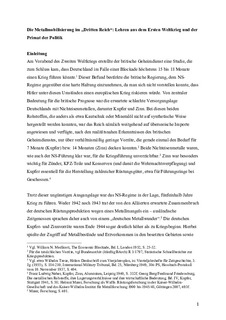Lernen und Lernversagen: Die "Metallmobilisierung" im Deutschen Reich 1939 bis 1945
Original version
Vierteljahrshefte für Zeitgeschichte. 2018, 66 (2), 233-266. 10.1515/vfzg-2018-0013Abstract
Moderne Kriege werden nicht nur auf dem Schlachtfeld, sondern auch in Fabriken und Bergwerken gewonnen. Diese Erfahrung machte die politische und militärische Führung des Deutschen Reichs zwischen 1914 und 1918, als die Seeblockade der britischen Marine Rohstoffimporte aus Übersee weitgehend unterband. Jonas Scherner geht am Beispiel der Beschaffung kriegswichtiger Metalle wie Kupfer und Zinn der Frage nach, wie Politiker, Ökonomen und Militärs im NS-Staat zwischen 1939 und 1945 mit diesem Problem umgingen, welche Lehren sie aus der Rohstoffbewirtschaftung im Ersten Weltkrieg zogen und was die „Metallmobilisierung“ über Politik und Strategie im nationalsozialistischen Deutschland verrät. During the Second World War, metal mobilisation was implemented in Germany, i.e. the recycling of metal products which were still in use, such as household goods, copper coins, church bells or power lines. Metal mobilisation contributed significantly to the coverage of German tin and copper usage for the war industry (both metals being essential raw materials). Its implementation was decisively shaped by the experiences with metal mobilisation during the First World War. Accordingly, the Nazi regime attempted to postpone requisitions for as long as possible, even if this entailed resorting to measures incurring higher costs for the war economy, as requestions could lead to discontent with in the population. This, by all means successful learning process, did not, however, prevent an over-mobilisation aiming at long perseverance after 1943, when Germany lost the military initiative in a war waged on many fronts
